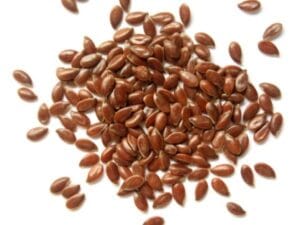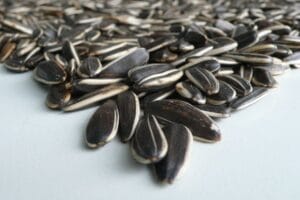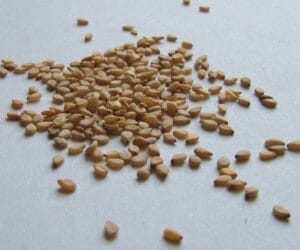Seeds are a powerful source of many nutritious ingredients and supply the body with needed fats, protein and fibers. They are full with antioxidants, reduce cholesterol and inflammations and assist the prevention of certain types of cancer. They are also very beneficial for your heart. Seeds are easy to eat and can be consumed “on the spot”, even while we are busy with other activates and they make an excellent supplement to various meals.
Chia seeds
 Chia seeds have the ability to regulate the blood sugar levels and abound with minerals and antioxidants. The main nutritious elements of the chia seed are the omega 3 fatty acids, the so called “good fats”, which improve the health of the heart and the bones and help memory. One seed contains an incredible 11 grams of fiber and is rich with calcium, potassium, and iron. Chia seeds can be enjoyed fresh, or mixed with 100% natural juice. A note of warning, though: excessive consumption can lower your blood pressure to dangerous levels!
Chia seeds have the ability to regulate the blood sugar levels and abound with minerals and antioxidants. The main nutritious elements of the chia seed are the omega 3 fatty acids, the so called “good fats”, which improve the health of the heart and the bones and help memory. One seed contains an incredible 11 grams of fiber and is rich with calcium, potassium, and iron. Chia seeds can be enjoyed fresh, or mixed with 100% natural juice. A note of warning, though: excessive consumption can lower your blood pressure to dangerous levels!
Two Healthy Recipes with Chia seeds
Flax seeds
 The healing properties of the flax seeds have been known since times long gone. The flax seed is rich in dietary fibers and omega 3 fatty acids. It contains ingredients called lignans which are very effective in the prevention of breast, prostate and colon cancer. They can be consumed together with cereals and yogurt, whole seeds or grinded. A warning: make sure you consume the seeds moderately because they contain large amounts of dietary fibers and overconsumption can cause intestinal cramps and bloating.
The healing properties of the flax seeds have been known since times long gone. The flax seed is rich in dietary fibers and omega 3 fatty acids. It contains ingredients called lignans which are very effective in the prevention of breast, prostate and colon cancer. They can be consumed together with cereals and yogurt, whole seeds or grinded. A warning: make sure you consume the seeds moderately because they contain large amounts of dietary fibers and overconsumption can cause intestinal cramps and bloating.
Sunflower seeds
 They are an excellent source of proteins, vitamins and antioxidants. A quarter of a cup of seeds contains more than 80 basic nutritious ingredients, including the key amino acid which helps process sugars into energy for the muscles. The sunflower seeds also contain vitamin b-complex, as well as key minerals like calcium, magnesium and selenium. They further contain high amounts of vitamin E and phytosterols, which help lower cholesterol. Try using sunflower seed butter and practice adding sunflower seeds in your sauces and salads, but try to avoid large packs of seeds because they contain high concentration of sodium.
They are an excellent source of proteins, vitamins and antioxidants. A quarter of a cup of seeds contains more than 80 basic nutritious ingredients, including the key amino acid which helps process sugars into energy for the muscles. The sunflower seeds also contain vitamin b-complex, as well as key minerals like calcium, magnesium and selenium. They further contain high amounts of vitamin E and phytosterols, which help lower cholesterol. Try using sunflower seed butter and practice adding sunflower seeds in your sauces and salads, but try to avoid large packs of seeds because they contain high concentration of sodium.
Sesame seeds
 Sesame seeds are a superb source of proteins, vitamins, minerals and fibers. What differentiates sesame seeds from others is the contained oleic acid (monounsaturated fatty acid) which helps reduce bad cholesterol while increasing the good one and reduces the risk of heart disorders and strokes. Its seed is rich with vitamin b-complex, magnesium, calcium, iron and copper. Sesame can be combined with various foods and is mostly used as a spice in sauces and salads.
Sesame seeds are a superb source of proteins, vitamins, minerals and fibers. What differentiates sesame seeds from others is the contained oleic acid (monounsaturated fatty acid) which helps reduce bad cholesterol while increasing the good one and reduces the risk of heart disorders and strokes. Its seed is rich with vitamin b-complex, magnesium, calcium, iron and copper. Sesame can be combined with various foods and is mostly used as a spice in sauces and salads.

